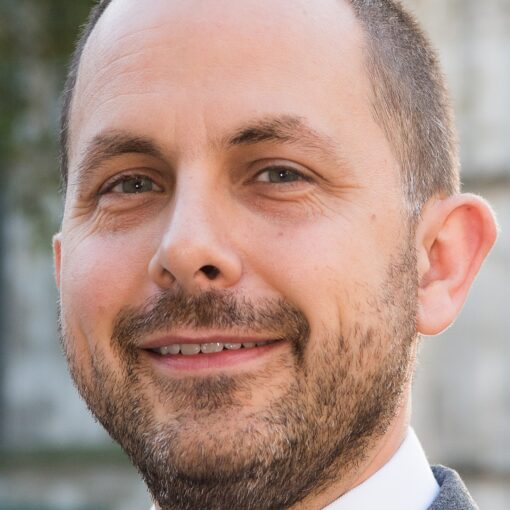PhD
| Director, Industry Partnerships and Commercialization (Partnerships Lead), Faculty of Engineering | |
|---|---|
| Imperial College London | |
Year entered into a non-academic position: 2016
Job highlight: I get to work on many different subjects, and I get to interact with and learn from world-leading scientists.
This means that every day I am learning new things about exciting, novel and innovative research!
No two days are the same.
My research training set me up to… develop resilience, a strong scientific background, analytical skills and a problem-solving attitude.
Left academia after: After 2 years of postdoctoral work
What’s your background?
I have always had a passion for science, for learning how things work, how to be objective and how to reason and solve problems. For this reason I decided to study Chemistry at the University of Pavia (Italy). During my studies, I became interested in the area of sustainable energy and to follow that path, I moved to the Netherlands to do a PhD in material and physical chemistry at Utrecht University working on solar energy. After this I did a postdoc at Delft University where I worked very closely with Philips Research to develop materials for low-energy-consuming lighting solutions.
This joint experience, between academia and industry, made me understand how important it is to promote and foster these collaborations.
In 2016 I joined Imperial College London as Corporate Partnerships Associate, working to support the academic community to develop research collaborations with industrial partners. In 2022, I took on the role of Director Industry Partnerships and Commercialization, in the Faculty of Engineering. Here I lead a team whose role is to foster and develop research collaboration between academics in the faculty of engineering and industry.
Why did you move away from academia?
During my PhD I already felt that the academic path was not for me… don’t get me wrong, I loved being a researcher: solving problems and finding creative ways of doing it, but the “problem” with science is…. if you want to confirm that what you have discovered actually solves that specific problem and that your amazing solution actually works… one lucky time is not enough and you need to repeat it and repeat it, change conditions and parameters until you have enough data to be able to say “yes this actually might work”. I still remember what a senior-scientist once told me: “a scientist needs to have a high threshold for frustration and resilience and needs to reach it at least once a day”. That made me think that I wasn’t sure I wanted to do that every day for the rest of my life.
It also made me reflect there could be other ways to use my skills and my passion to contribute to and support scientific breakthroughs. Now, I have found a new way of applying my skills where I feel I can make a larger contribution while still learning every day.
Is there anything you miss about academia?
I have the privilege to still work in an academic environment, even though I do not do research anymore, so I still have the opportunity to discuss and be exposed to amazing new scientific discoveries and to be able to discuss those with world leading scientists.
How did you get this job? Did you face any challenges when considering a move away from academia or applying for the role?
I simply applied…
During my postdoc, working very closely with Philips Research, I used to talk about how much I loved finding myself at the interface between academia and industry. One day, one of my colleagues told me: “Why don’t you consider doing that as a job?” All of a sudden, something clicked in my brain, but I was not sure if it was the right choice for me and most importantly, I had no idea where to start. I did lots of research on those types of roles: Did they exist? What did they involve? What skills did they require? …after a couple of months a position at Imperial came up.
The transition has not been easy, and I had to learn many new skills like: negotiating contracts, managing IP, dealing with multiple short deadlines at any given time, and how to do this job almost from scratch. Despite the hurdles I kept a positive attitude and I was lucky to work with amazing people and in a great environment that helped me succeed .
What motivated you to/why did you choose the sector you transitioned into?
During my postdoc I came to the realization that collaborations between academia and industry are key to allow important scientific breakthroughs to have an impact on the economy and society as a whole.
For this reason I was looking for a role that would allow me to be at the interface between these two worlds. For me it was really important to maintain a connection with science and research.
How did your PhD prepare you for your current job? For example, what were the transferable skills that you developed during your PhD that are most relevant to your current job?
My experience as a researcher had armed me with a strong scientific background, analytical skills and a problem-solving attitude, and the ability to communicate both in writing and verbally to a very high standard.
Moreover,
as a PhD student you need to be quite self-driven, independent and have a strong pragmatic attitude, while being able to collaborate with colleagues and be part of a team. All of these skills are highly valued by a wide range of employers.
Did you have any preconceptions about your sector that proved to be wrong?
Since I was joining a more “corporate” environment (albeit still embedded into a university) which had to deliver towards annual financial targets, I was afraid that the office would be a very competitive environment. Instead, I found an incredibly supportive and collaborative team, who took time to teach me and allow me to learn on the job, supporting me when needed and helping me to grow and strive.
Can you describe a typical week in your job?
No day is the same, I work as an industry liaison and technology transfer professional for Imperial College London. I work with both businesses and academia, focusing on the engineering disciplines, supporting the development of strategic research collaborations and the commercialization of technology via licensing or start-up formation. This means: supporting researchers and helping them identify the problems and common areas of interest between themselves and the business partners; shape the research programme to ensure that we can maximize value from both sides; support the academics in discussions related to costing, intellectual properties and contractual matters to ensure we protect academic freedom while allowing results to be translated and implemented by the industrial partners.
This role is external facing, because I act as a match-maker, and try to understand the needs and challenges of businesses, and match them with the right experts at the University.
This role is also internal facing, because I advise the faculty on industry engagement, identify the companies that work in areas that are interesting for our researchers, explore options for collaborations, attract funding and help shape and progress initiatives which involve corporate partners.
Do people with a PhD frequently get hired in the company/sector?
Yes most of my colleagues (or those with a similar role in other universities) have a PhD.
What are your favourite parts of your job?
Hearing enthusiastic scientists talk about their projects and negotiating deals.
What are your reflections on your career path?
I never had a career path per se. When studying at university I knew I wanted to do a PhD as I enjoyed being in the lab and doing research and it was kind of the “next obvious step”, but during my PhD I realized that the life of an academic researcher was not for me.
I have always tried to understand what really motivates me and “gets me out of bed” in order to steer my decisions in that direction. It is also about taking opportunities that come by and sometimes taking a leap of faith.
Do you have any advice for current graduate students and postdocs considering a career outside of academia?
Do not be afraid to try something new or to change your career path. You should follow your passions and really try to find what motivates you.
What do you know now that you wish you’d known when exploring a transition?
I felt somewhat “guilty” about leaving academia/research. My network mostly included people who had pursued or were pursuing the academic/researcher path and instead there I was looking for a “way out of the lab”. I wish I had the opportunity to be more exposed to other career paths at the time and to be more aware of the multitude of opportunities that were out there!
Can you recommend any relevant resources, organisations or events that might help somebody new to the sector find out more about it?
If you are interested in a tech/Knowledge transfer Job you should visit https://www.praxisauril.org.uk/





